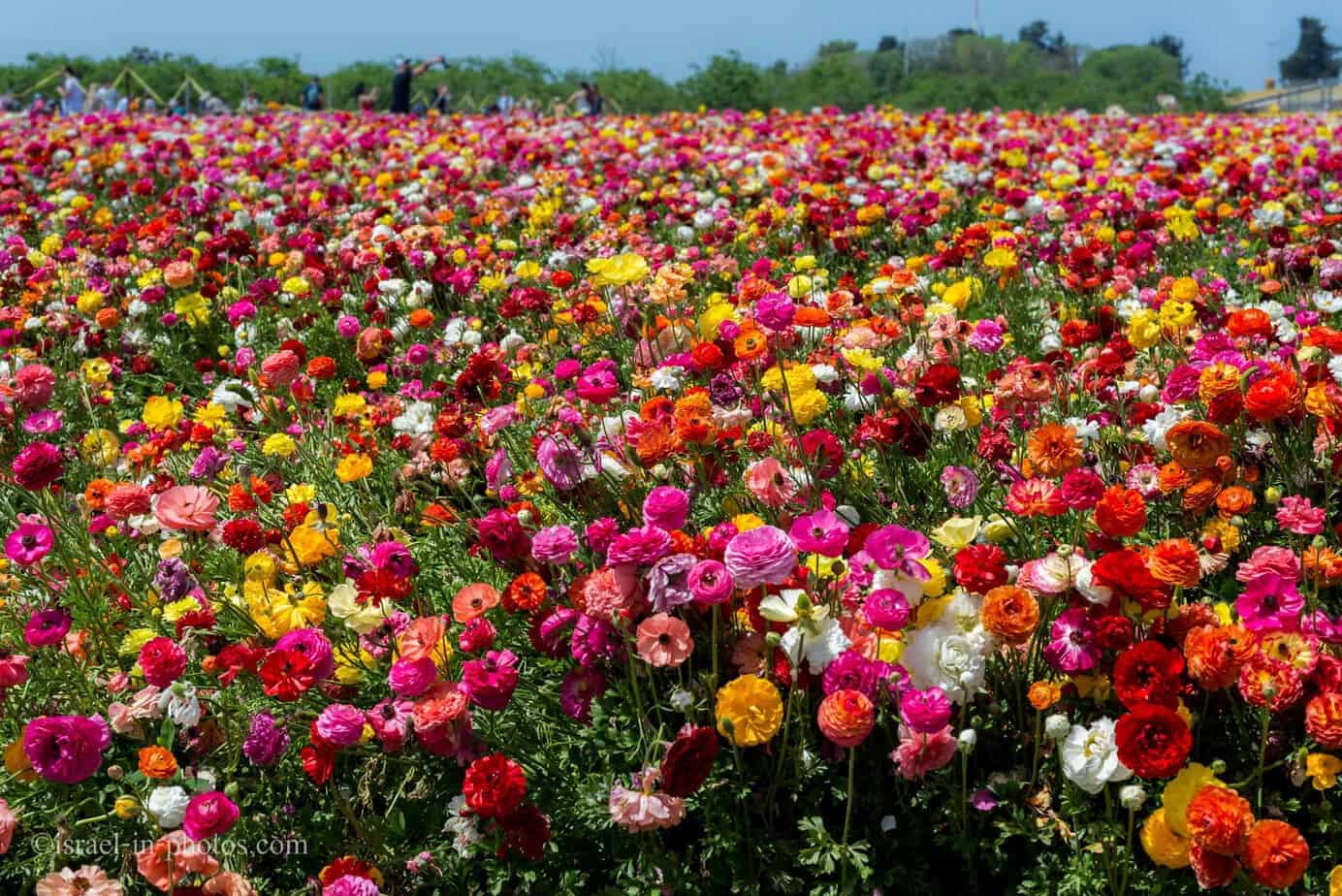Alpaca Farm, Mitzpe Ramon – Visitors Guide
At Alpaca Farm, you can meet and learn about alpacas and llamas. Moreover, you can join horseback riding and stay in suites and cabins.
Note: if you want additional info about animals and wildlife, check out Zoos and Aquariums in Israel.
Table of Contents
Map
Alpaca Farm is situated several kilometers to the west of Mitzpe Ramon.
Directions for drivers: Link to Waze and Link to Google Maps
Directions for public transport: Link to Moovit
Interactive map of the area:
Opening Hours
Thursday – Saturday: 08:30 – 18:30
Entry with pets is not allowed.
Entrance Fee (for individuals)
Adult/child (over three years old) – 30 NIS
Soldier/policeman/college student/pensioner – 25 NIS
Handicap – 15 NIS
Note: opening hours and ticket prices were updated in March 2021. In any case, recheck the official site before visiting.
The Entrance Fee includes the Story Of the Farm, Feeding The Alpaca, and the Llama from the hand and independent tour around the Farm. Also, the rate includes some of the kids’ corner activities.
Note: unless stated otherwise, all quotes were taken from the official site.
Contact Information
Telephone: 08-6588047, 052-8977010
Email: office@alpaca.co.il
Horseback Rides
Alpaca Farm also offers horseback rides.
The farm is a great starting point for horseback rides- the cliffs, the crater, the extraordinary scenery, and observation points, the Nabatian terraces and tiny orchards assure it will be an unforgettable ride.
Currently, there are three horseback ride options:
- “Rim-Ride” – A peaceful 1.5 hours ride to the crater’s rim, suitable for everyone (over the age of 9). And it costs 175 NIS on weekdays and 195 NIS on weekends.
- “Extended-Rim” – 2.5-hour ride suitable for experienced riders who can trot and canter. And it costs 300 NIS on weekdays and 450 NIS on weekends.
- “The Real Thing” – is a four-hour horseback ride that takes you down to the crater. And it costs 600 NIS on weekdays and 900 NIS on weekends.
Note: the mentioned prices are per rider.
Suites & Cabins
You can find Suites & Cabins at Alpaca Farm. Thus, if you want to stay at the farm or explore the area for a few days, this can be a good option. You can check the availability and prices of find this property and others in the Negev using Booking.com.
Alpaca and Llama
Do you know how to determine who is who? It is quite simple: Llama is bigger and stronger and used to carry weights. Similar to camels that are used in the desert. While Alpaca is a much tender animal, and the main purpose is its beautiful fur.
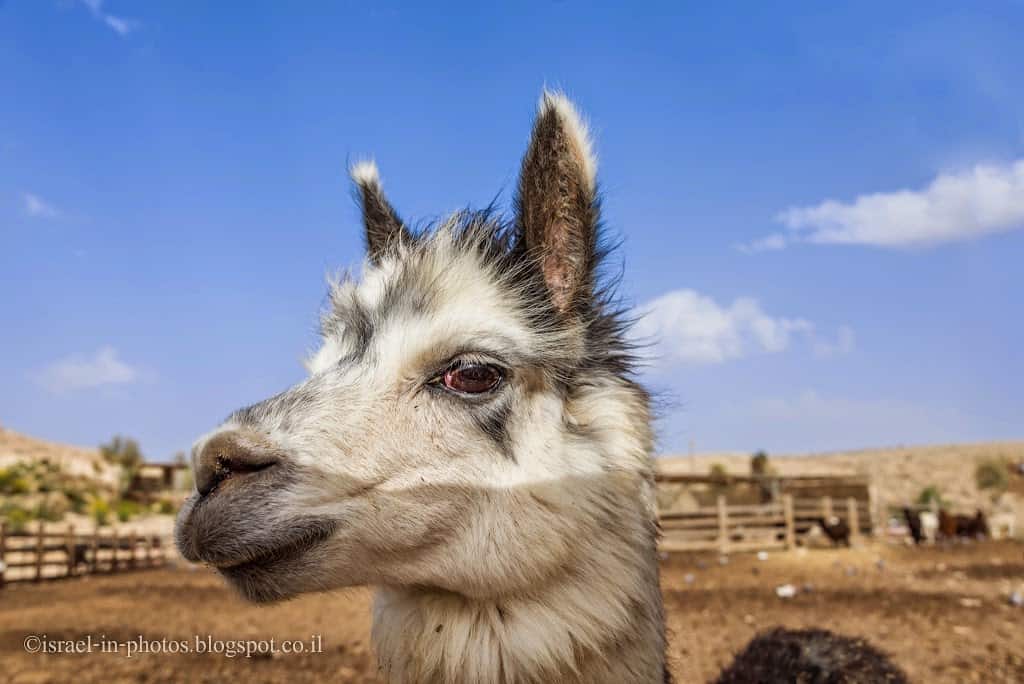
Do you know who the closest Animals of Llamas and Alpacas are? Maybe it is hard to believe, but it is the camel (actually, they were created as a breeding of different camel types). Thus, they also have the habits of camels. Meaning if you get on their nerves, they will spit on you.
Alpaca Farm during Passover
We visited the alpaca farm during Passover vacation. It is the season when the shearing of the alpacas takes place. We received a short explanation and a demonstration.
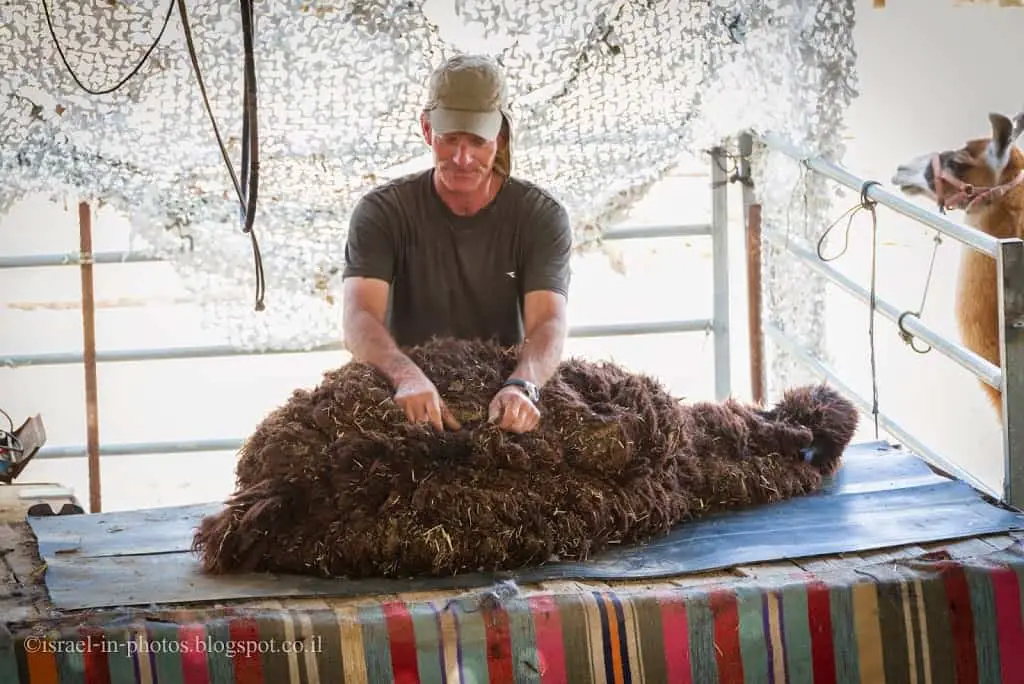
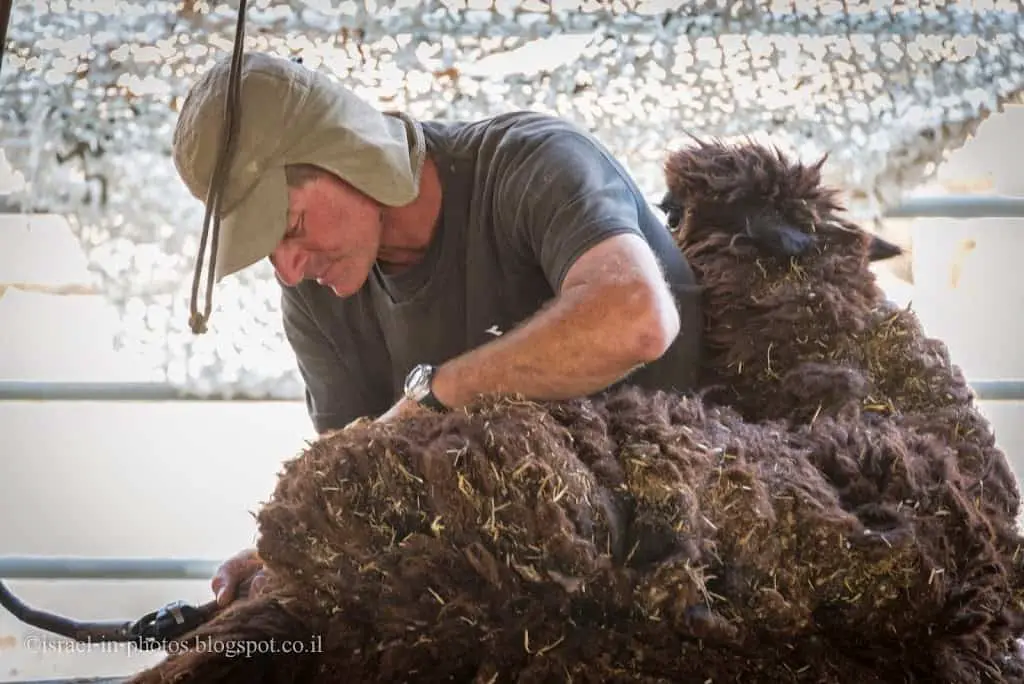
Then we were invited into a small factory where the wool is processed.
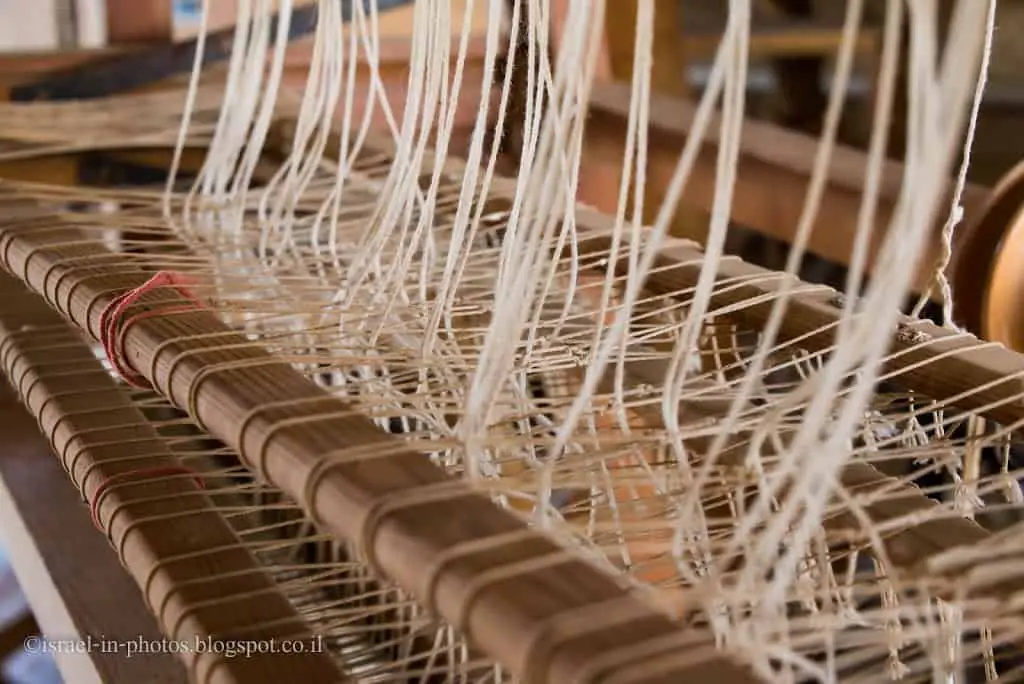
We learned about the process of spinning the alpaca wool – from fleece to yarn.
As you can see, according to machinery, there are several steps in production. They start with washing and combing and end with thread production. These threads are later used for clothing.
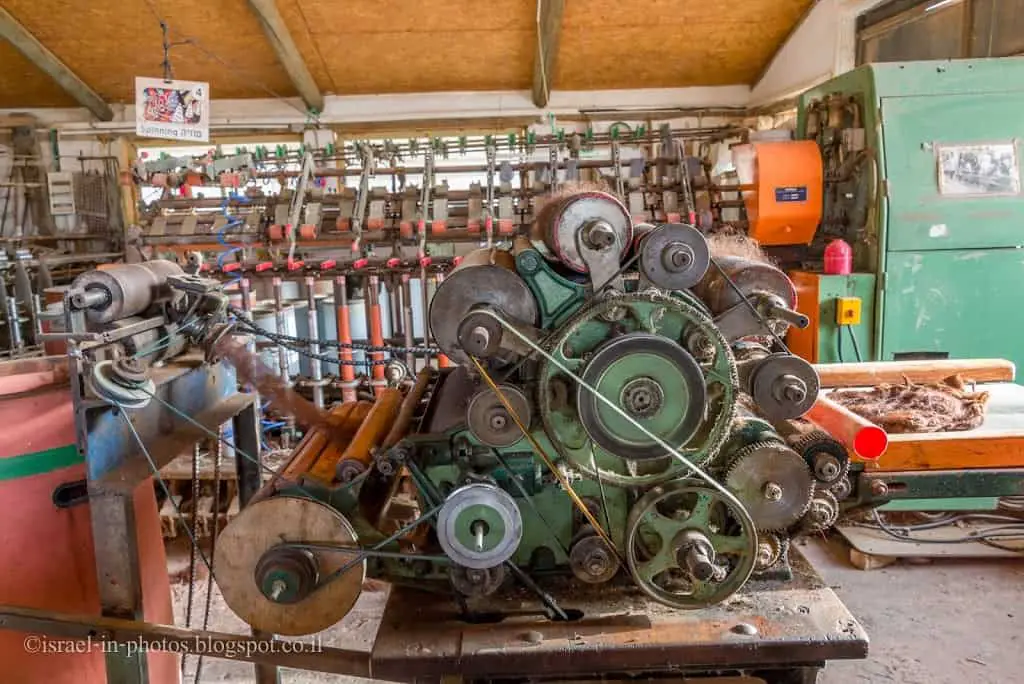
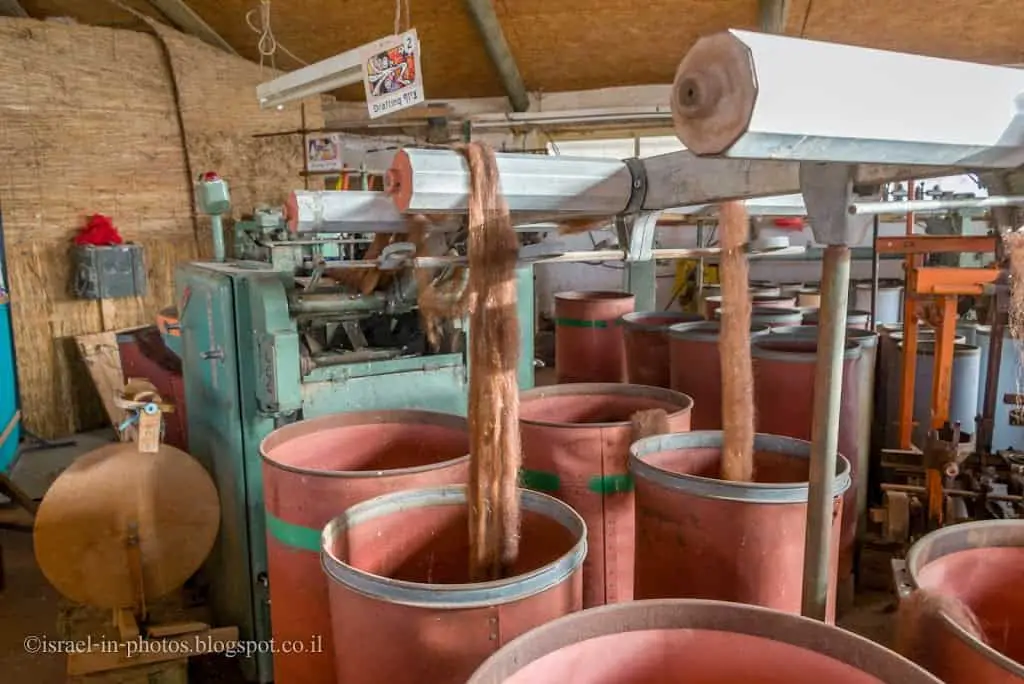
There is a small store where you can buy some of their products. There were mainly small clothing accessories like gloves and hats.
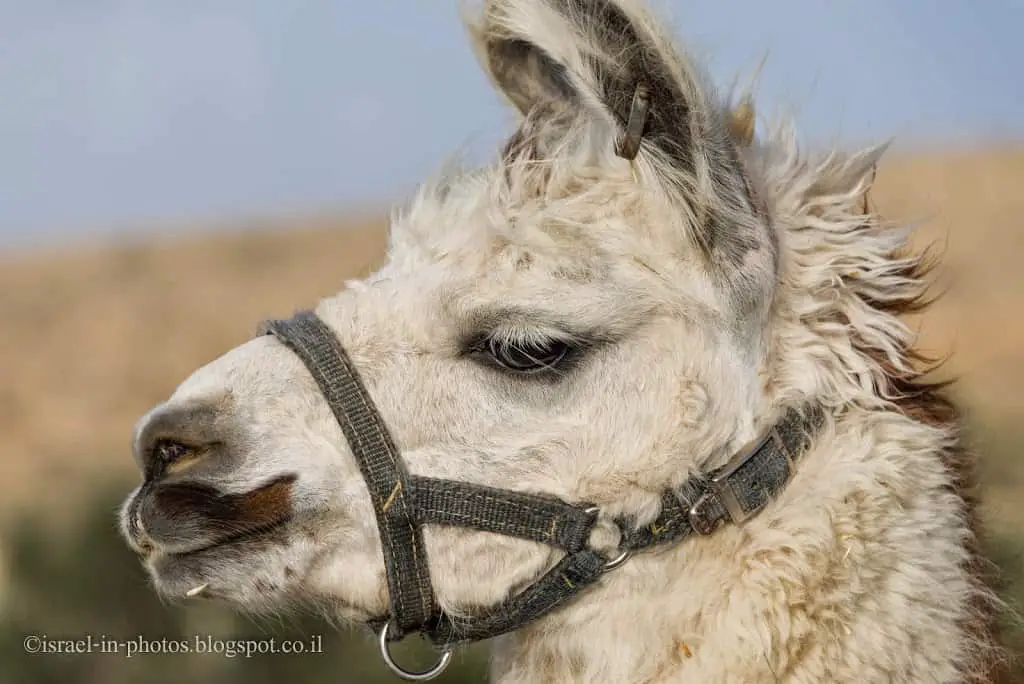
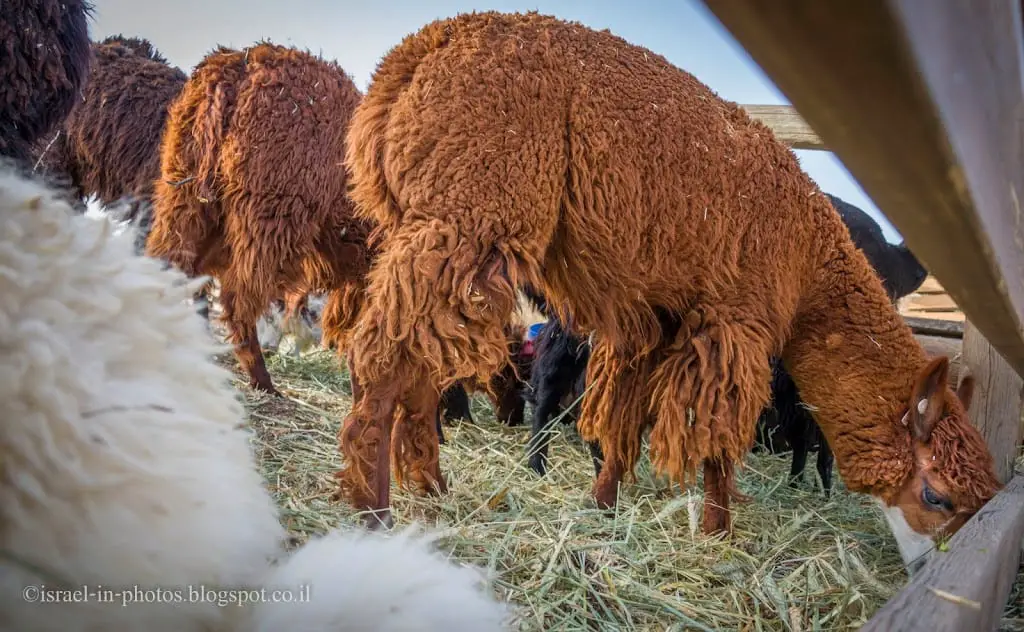
In the following short video that my Dad made, you can see our guide telling a little about the process.
History
We wandered to the Andes Mountains in South America, which rise over 4,000m above sea level. In the Andes, we first met the charming llamas and alpacas. The alpacas, which looked like a combination of graceful deer with wooly sheep (but are miniature camels), captured our hearts immediately. It was love at first sight, and that is how the idea of bringing them to Israel started.
For months we traveled between the villages in the mountains where Indians who are descendants of the famous Inca live. We learned that the alpacas had a vital role in the economy and culture of the Inca empire. They milked the alpacas, knitted clothes from their fine wool to protect the people from the piercing cold, the llamas were used as beasts of burden and even as sacrifices to the gods.
We picked out and bought the finest alpacas and llamas we saw and once we had a nice herd we all flew together on a special flight back home.
In Israel we searched for a suitable place; high, arid, cool, beautiful, and spacious. In the Negev highlands, where three wadis, scattered with 2,000 years old Nabatians terraces, intersect, we built the alpaca farm. We soon found out that the natural charm of the animals and the colorful activity in the farm, combined with the idea of a settlement in the highlands and the beautiful landscapes, created an attractive site for visitors of all ages from all around Israel and the world. Up to date, we had over one million visitors on our farm!
We found out that the existing wool spinners cannot process the alpaca wool, which is much finer and has many more different colors than the sheep wool. We then established on the farm the wool hut where we spin our wool.
The location right in the heart of the unspoiled Negev highlands, the beautiful desert scenery, the rare geological phenomena of the craters, and the rich history, make the farm an ideal starting point for desert horse rides. We purchased wild horses and trained them for the desert rides. Our horses won national and international titles but are also known for their excellent temper.
Today we raise a herd of llamas and alpacas, horses, donkeys, angora sheep, and many more animals. The whole process of wool production takes place on the farm- the raising of the animals, the shearing, and the spinning of the wool- and that makes the farm one of its kind in the world!
We will be very happy to have you on our farm!
The Dvir family, the llamas and the alpacas.
Nearby Attractions
Alpaca farm is located near Mitzpe Ramon. And Mitzpe Ramon overlooks Ramon Crater. At Mitzpe Ramon, you can hike along the edge of the crater or visit the Makhtesh Ramon visitors center. Inside Ramon Crater, you can visit HaMinsara and Ammonite Wall. And a little further ahead, you can find Ein Avdat and Avdat National Parks.
Summary
My daughter, who was four years old during the visit, enjoyed the visit. And since they have the shearing festival at the Alpaca Farm annually during Passover vacation, this would be the recommended visiting period. Thus, if you love animals, this can be a wonderful several hours attraction.
Also, I have not explicitly mentioned it, but the tour is aimed at families with children.
Note: if you want to see the full guide for this area, check out Mitzpe Ramon And Makhtesh Ramon.
Have you ever been to Alpaca Farm? Tell us about your experience in the comments below.
That’s all for today, and I’ll see you in future travels!
Stay Tuned!
Additional Resources
Here are several resources that I created to help travelers:- Trip Planner with Attractions and Itineraries is the page that will help you create your perfect travel route.
- What is the Best Time to visit Israel? To answer this question, we will consider the weather, prices, holidays, festivals, and more.
- Information and Tips for Tourists to Israel will answer the most common questions tourists have about Israel (including safety, passports, weather, currency, tipping, electricity, and much more).
- Israel National Parks and Nature Reserves include a complete list, top ten, map, tickets (Israel Pass, Matmon, combo), and campsites.
- If you are looking for things to do, here are the pages for Jerusalem, Tel Aviv, Haifa, Sea Of Galilee, Akko (Acre), Eilat, Nazareth, Safed (Tzfat), and Makhtesh Ramon.





